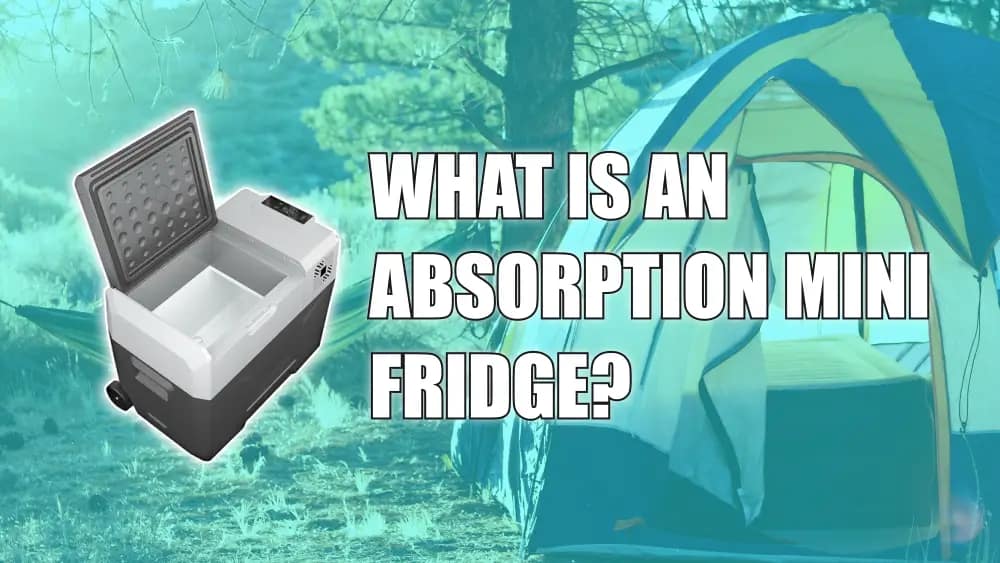Looking for a compact cooling solution that doesn’t rely on electricity? Absorption mini fridges might just be the answer you’ve been searching for. These innovative refrigeration units operate on a unique principle: harnessing the power of heat, ammonia, and water to provide efficient cooling. Whether you’re planning an outdoor adventure, living off-grid, or simply looking for a reliable alternative, absorption mini fridges offer a range of benefits and functionalities worth exploring.
In this post, we’ll delve into the world of absorption mini fridges, uncovering their mechanism, advantages and disadvantages. Get ready to discover a cool and versatile refrigeration option that goes beyond the traditional norm.
What is an absorption mini fridge?

An absorption mini fridge is a type of refrigerator that operates using an absorption cooling system. Unlike conventional compressor-based fridges, absorption fridges use a combination of heat, refrigerant, and an absorber to create a cooling effect. They typically don’t have moving parts or a compressor, making them quieter and potentially more durable. Absorption mini fridges are often used in RVs, campers, off-grid locations, and other settings. Usually, people prefer them because they’re compact, strong and quiet. They can run on electricity, propane, or natural gas, offering flexibility in different environments.
Advantages of Absorption Mini Fridge
Absorption mini fridges offer amazing several advantages such as:
Silent Operation: Absorption systems are known for their quiet operation, making them suitable for environments where noise is a concern, such as bedrooms, offices, or shared living spaces.
Versatile Power Options: Absorption mini fridges can operate on multiple power sources, including electricity, propane, or natural gas. This versatility makes them ideal for use in various settings, such as RVs, cabins, or off-grid locations.
No Moving Parts: Absorption mini fridges have no moving parts like compressors, which can make them more durable and less prone to mechanical failures or malfunctions.
No Vibrations: Since absorption systems lack compressors, they do not generate vibrations during operation. This feature can be beneficial for storing delicate or sensitive items, such as wines or medications, without the risk of disturbance.
Environmental-friendly: Absorption systems do not require freon or chlorofluorocarbons (CFCs), making them more environmentally friendly and reducing the potential for ozone depletion.
Minimal Maintenance: Absorption mini fridges generally require less maintenance compared to compressor systems. They typically have fewer components, reducing the likelihood of repairs or part replacements.
Cold-Weather Performance: Absorption systems are ideal for colder environments as they can continue to function efficiently even at lower temperatures, unlike some compressor-based systems that may struggle in extreme cold.
Disadvantages of Absorption Mini Fridge
While absorption mini fridges have their advantages, they also come with a few disadvantages:
Slower Cooling Rate: Absorption systems generally have slower cooling rates compared to compressor fridges. It may take more time for the fridge to reach and maintain temperatures, especially when dealing with larger temperature differentials or in hot environments.
Less Efficient: Absorption mini fridges are typically less energy-efficient than compressor-based models. They consume more energy to achieve the same cooling effect, resulting in higher electricity or fuel consumption over time. It is estimated that they consume 3 to 4 times more electricity than compressor mini fridges.
Limited Cooling Capacity: Absorption systems may have limitations in terms of their cooling capacity. They might not be able to achieve very low freezing temperatures or efficiently cool large quantities of items compared to compressor models.
Bulkier Design: Absorption mini fridges tend to have a bulkier and larger design compared to thermoelectric or compressor fridges. This can limit their portability and make them less suitable for compact spaces or on-the-go lifestyles.
High Cost: Absorption mini fridges are generally more expensive compared to thermoelectric or compressor models. The technology and materials in absorption systems contribute to higher manufacturing and purchasing costs.
Maintenance Requirements: Absorption fridges may require occasional maintenance, such as cleaning the burner, flue, or chimney, to ensure optimal performance. Neglecting maintenance tasks can result in decreased efficiency or malfunctions.
Weight and Size: Absorption mini fridges tend to be heavier and bulkier compared to other types of mini fridges. This can make them less portable and challenging to move or transport, especially in situations where space is limited.
Limited Availability: Absorption mini fridges are commonly found in specialized stores or specific markets, which can make it more difficult to find a suitable option or replacement parts if needed.
Noise Level: While absorption fridges are generally quieter during operation compared to compressor models, they can still produce a noticeable humming or hissing sound. This noise level may be a concern for individuals seeking complete silence or for use in noise-sensitive environments.
Are Absorption Mini Fridges Good?
Absorption mini fridges can be a good choice depending on your specific needs and circumstances. They offer several advantages that make them suitable for certain situations. For example, people often use them in off-grid living, RVs, camping, and other outdoor activities where access to electricity may be limited. They can run on alternative fuel sources like propane or natural gas, making them versatile and independent from traditional electrical power.
However, it’s important to consider their limitations, such as slower cooling rates and higher initial costs. Assessing your requirements and weighing the pros and cons will help you determine if an absorption mini fridge is the right fit for you.
Final thought. Absorption fridges can be a great choice for off-grid living, camping, or RV trips. Especially in situations where you don’t have a lot of access to electricity. They can also be powered by alternative fuel sources like propane or natural gas. However, they may not be as energy-efficient and budget-friendly as a compressor or thermoelectric fridge. Ultimately the choice depends on your and your specific needs.

With over 15 years of experience in the appliance industry, I am a passionate advocate for efficient and stylish mini fridges. I specialize in energy-saving models and compact living solutions. As a certified appliance repair technician, I have a deep understanding of mini fridge maintenance and troubleshooting.

